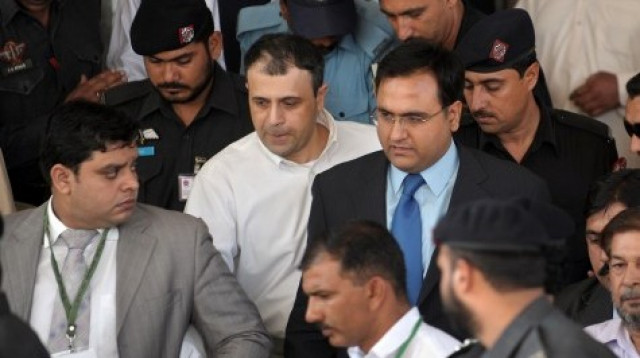Bank of Punjab scam: Hamesh Khan, Sheikh Afzal denied bail
CJ says the men who absconded do not deserve the concession of bail.

The Lahore High Court (LHC) on Tuesday denied bail to the Bank of Punjab’s (BoP) former president Hamesh Khan and his co-accused Sheikh Afzal of Haris Steel Mill in the Rs9 billions loan scam.
The division bench headed by Chief Justice Ijaz Ahmad Chaudhry after hearing lengthy arguments from both sides observed that the accused had been absconders and did not deserve the concession of bail.
Khan’s lawyer, Mahmood A Sheikh, argued that his client had no role in the scam as he was on leave when all the allegedly illegal loans were sanctioned. When he found out about the fraud, he referred the matter to the National Accountability Bureau (NAB) and suspended seven bank officers including the general manager, he said.
He said his client had obtained interim bail from the High Court but the NAB authorities had continued to raid his residence. Their hostility forced Khan to flee abroad, the lawyer said, adding that Khan had himself written to the Supreme Court that he wanted to return. He said the loan amount had been recovered by the NAB and other accused had been granted bail.
The counsel declared his client innocent and said there was no evidence against him. He said many officers had investigated the case and there was more than one version. He said the petitioner could not be held behind the bar.
A panel of advocates including Ahmad Awais, Waqar Hassan Mir and Asad Manzoor Butt defended Sheikh Afzal.
Advocate Maqsooma Zahra Bokhari, counsel for BoP, in her arguments said an independent inquiry submitted before the Supreme Court had declared Khan and Afzal as the accused in the fraud. She said Khan was the leader of the gang involved in the sanctioning of illegal loans. She said Afzal despite being behind the bars was going to sell his property in Dubai. She said the accused were not trust worthy and may again flee abroad if the court released them on bail.
NAB deputy prosecutor Mian Bashir also opposed the bail petitions. He said Khan had allowed loans worth billions of rupees’ against false collateral and caused a huge loss to the bank, therefore, the relief of bail should be denied to him. He said Khan had fled abroad despite his name being placed on the Exit Control List (ECL).
The CJ observed that the court was aware of the fact that it took months for the Supreme Court to get the accused arrested by issuing red warrants. The bench dismissed bail petitions.
The NAB filed a reference on Sept 27, 2007, against 12 people, including six officials of the BoP and six other accused in a Rs9 billion fraud. Khan’s name was put on the ECL after the reference had been filed. He, however, managed to leave the country on March 27, 2008.
Khan was arrested in the US following Pakistan government’s request to Interpol and was extradited to Pakistan.
Sheikh Afzal sought concession of bail saying he was wrongfully implicated in the case and was in ill health.
A team comprising of Federal Investigation Agency (FIA) and NAB officials went to Washington, DC on October 12, 2009 for talks with senior members of the US justice department and the Federal Bureau of Investigation.
They were told about Khan’s fraud and the US officials after arresting him cooperated in the extradition process under Clause 3 (17) of the Extradition Treaty (Anti-Money Laundering Act) in December 2009.
Afzal and his son Haris Afzal were arrested by the FIA from Malaysia in November 2009. According to the investigators, Afzal, a director of Haris Steel, with co-accused Muhammad Munir, Ali Ijaz, Abid Raza and Irfan Ali, in connivance with Khan and other officials opened 23 ‘fake’ accounts with forged national identity cards and obtained loans of approximately Rs9 billion from 2005 to 2007 using fake documentation, bogus collaterals, fictitious guarantees and mortgage deals executed by fictitious persons.
Published in The Express Tribune, May 25th, 2011.



















COMMENTS
Comments are moderated and generally will be posted if they are on-topic and not abusive.
For more information, please see our Comments FAQ